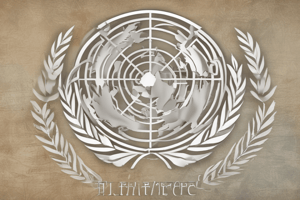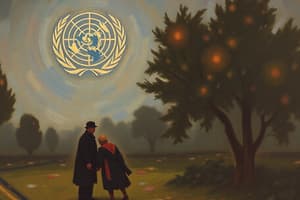Podcast
Questions and Answers
What is the main objective of the United Nations?
What is the main objective of the United Nations?
- To provide international travel facilitation
- To oversee arms proliferation issues
- To prevent future world wars (correct)
- To promote economic development and humanitarian assistance
Which of the following is NOT one of the UN's principal organs established by the UN Charter?
Which of the following is NOT one of the UN's principal organs established by the UN Charter?
- The General Assembly
- The Security Council
- The Trusteeship Council (correct)
- The International Court of Justice
What is the role of the UN Secretariat?
What is the role of the UN Secretariat?
- To promote international economic and social co-operation and development
- To adjudicate disputes among nations
- To enforce the terms of peace agreements
- To carry out day-to-day duties required to operate and maintain the UN system (correct)
What is the primary judicial organ of the UN?
What is the primary judicial organ of the UN?
What is the role of the Group of 77 at the UN?
What is the role of the Group of 77 at the UN?
What is the function of UN peacekeepers?
What is the function of UN peacekeepers?
What is the main source of funding for the UN?
What is the main source of funding for the UN?
What is the Millennium Development Goals (MDGs)?
What is the Millennium Development Goals (MDGs)?
What is the purpose of Model United Nations (MUN)?
What is the purpose of Model United Nations (MUN)?
Flashcards
What is the United Nations?
What is the United Nations?
An intergovernmental organization established in 1945 to promote international cooperation and prevent conflicts.
What are the UN's objectives?
What are the UN's objectives?
Maintaining peace, protecting human rights, delivering aid, promoting sustainability, and upholding international law.
What is the General Assembly?
What is the General Assembly?
The main deliberative assembly of the UN, composed of all member states.
What is the Security Council?
What is the Security Council?
Signup and view all the flashcards
What is the UN Secretariat?
What is the UN Secretariat?
Signup and view all the flashcards
What is the International Court of Justice (ICJ)?
What is the International Court of Justice (ICJ)?
Signup and view all the flashcards
What is the Economic and Social Council (ECOSOC)?
What is the Economic and Social Council (ECOSOC)?
Signup and view all the flashcards
Who are UN Peacekeepers?
Who are UN Peacekeepers?
Signup and view all the flashcards
What is the Group of 77 (G77)?
What is the Group of 77 (G77)?
Signup and view all the flashcards
Study Notes
The United Nations (UN) is an intergovernmental organization established after World War II with the aim of preventing future world wars and succeeding the ineffective League of Nations. The UN's objectives include maintaining international peace and security, protecting human rights, delivering humanitarian aid, promoting sustainable development, and upholding international law. The UN has 193 member states as of 2023. The organization's mission to preserve world peace was complicated in its early decades due to Cold War tensions between the United States and Soviet Union. The UN has six principal operational organizations and a multitude of specialized agencies, funds, and programs. The UN's chief administrative officer is the Secretary-General, currently António Guterres. The UN is financed by assessed and voluntary contributions from its member states. The UN's effectiveness has been both praised and criticized. The UN saw a radical expansion in its peacekeeping duties after the Cold War, taking on more missions in five years than it had in the previous four decades. The organization faced several simultaneous, serious crises in the early 1990s within Somalia, Haiti, Mozambique, and the nations that previously made up Yugoslavia. From the late 1990s to the early 2000s, international interventions authorized by the UN took a wider variety of forms. Under the eighth Secretary-General, Ban Ki-moon, the UN intervened with peacekeepers in crises such as the War in Darfur in Sudan and the Kivu conflict in the Democratic Republic of the Congo and sent observers and chemical weapons inspectors to the Syrian Civil War.Overview of the United Nations and its key organs, roles, and objectives:
-
The UN was established in 1945 to promote international cooperation and prevent conflicts.
-
The Millennium Development Goals (MDGs) were adopted in 2000 to achieve international development in areas such as poverty reduction and public health by 2015. The Sustainable Development Goals (SDGs) were launched in 2015 to succeed the MDGs.
-
The UN has five principal organs established by the UN Charter: the General Assembly, the Security Council, the Economic and Social Council, the International Court of Justice, and the UN Secretariat. The Trusteeship Council suspended its operations in 1994.
-
The General Assembly is the main deliberative assembly of the UN and is composed of all UN member states. The Security Council is charged with maintaining peace and security amongst nations and has 15 member states, including five permanent members with veto power.
-
The UN Secretariat carries out the day-to-day duties required to operate and maintain the UN system and is headed by the secretary-general, who is assisted by the deputy secretary-general.
-
The International Court of Justice (ICJ) is the primary judicial organ of the UN and adjudicates disputes among nations. The Economic and Social Council (ECOSOC) assists the General Assembly in promoting international economic and social co-operation and development.
-
The UN system includes 15 specialized agencies, which perform functions as diverse as facilitating international travel, preventing and addressing pandemics, and promoting economic development.
-
The UN sends peacekeepers to regions where armed conflict has recently ceased or paused to enforce the terms of peace agreements and to discourage combatants from resuming hostilities. Peacekeeping forces are voluntarily provided by member states.
-
The UN has carried out 71 peacekeeping operations since 1947, and as of April 2021, over 88,000 peacekeeping personnel from 121 nations have been deployed on missions.
-
The UN has drawn criticism for perceived failures, including member states' reluctance to achieve or enforce Security Council resolutions, and UN peacekeepers being accused of child rape, soliciting prostitutes, and sexual abuse during various peacekeeping missions.
-
The Group of 77 (G77) at the UN is a loose coalition of developing nations designed to promote its members' collective economic interests and create an enhanced joint negotiating capacity in the UN.
-
The UN has sought to improve its accountability and democratic legitimacy by engaging more with civil society and fostering a global constituency.Overview of the United Nations and its various purposes and bodies:
-
The UN was founded in 1945 with the aim of promoting peace and security, encouraging disarmament, protecting human rights, promoting economic development and humanitarian assistance, and addressing environmental and climate issues.
-
The UN has been involved in various arms-limitation treaties and oversees arms proliferation issues through bodies such as the International Atomic Energy Agency and the Organization for the Prohibition of Chemical Weapons.
-
The UN plays a significant role in promoting and protecting human rights through bodies such as the United Nations Commission on Human Rights and the United Nations International Research and Training Institute for the Advancement of Women.
-
The UN is involved in promoting economic development and humanitarian assistance through bodies such as the UN Development Programme and the United Nations Children's Fund.
-
The UN has made environmental issues a prominent part of its agenda, with the UN Environmental Programme established in 1972 and the Earth Summit in 1992.
-
The UN is funded through assessed and voluntary contributions from member states, with the peacekeeping budget assessed separately from the main organizational budget.
-
Evaluations of the UN have been mixed, with some citing its accomplishments in promoting human development and peacekeeping efforts, while others criticize its structure and role in world affairs as undemocratic and ineffective.Critics of the United Nations have raised concerns regarding several aspects of the organization, including its bias towards certain countries, its effectiveness in solving global issues, and its bureaucratic inefficiency and corruption.
Exclusion of countries from the UN has been a contentious issue, with Taiwan being consistently denied membership and France initially being excluded from conferences that created the organization.
During the Cold War, both the United States and the Soviet Union accused the UN of favoring the other. The US was also concerned about Soviet sympathizers employed by the UN.
Critics have accused the UN of excessive attention to Israel's treatment of Palestinians and anti-Israel bias. Saudi Arabia's appointment to the UN Human Rights Council was also criticized.
The US has preferred a weaker UN to avoid interference with American policies. Some scholars debate the overall effectiveness of the UN, with realists arguing it is ineffective and liberals arguing it is effective.
The UN has been accused of bureaucratic inefficiency, waste, and corruption, with the Oil-for-Food Programme being a notable example.
Model United Nations (MUN) is an extracurricular activity inspired by the UN that simulates UN activity and educates students on global issues.
Studying That Suits You
Use AI to generate personalized quizzes and flashcards to suit your learning preferences.




